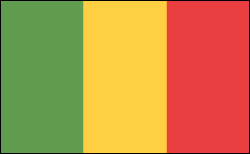Mali History


Economic Development and Democracy
In the 1960s, Mali concentrated on economic development, continuing to accept aid from both Soviet bloc and Western nations, as well as international agencies. In the late 1960s, it began retreating from close ties with China. But a purge of conservative opponents brought greater power to President Modibo Keita, and in 1968, the influence of the Chinese and their Malian sympathizers increased. The army overthrew the government on Nov. 19, 1968 and brought Mali under military rule for the next 20 years. Mali and Burkina Faso fought a brief border war from Dec. 25 to 29, 1985. In 1991, dictator Moussa Traoré was overthrown, and Mali made a peaceful transition to democracy. In 1992, Alpha Konaré became Mali's first democratically elected president.
In the early 1990s, the government fought the Tuaregs, nomads of Berber and Arab descent who inhabit the northern desert regions of Mali and have little in common with Mali's black African majority. The Tuaregs accused the government of marginalizing them politically and culturally. A peace agreement was signed in 1995, and thousands of Tuareg refugees returned to the country.
Mali's second multiparty national elections took place in May 1997, with President Konaré winning reelection.
Konaré won international praise for his efforts to revive Mali's faltering economy. His adherence to International Monetary Fund guidelines increased foreign investment and helped make Mali the second-largest cotton producer in Africa. Konaré was also the chairman of the 15-nation ECOWAS (the Economic Community of West African States), which in recent years has concentrated on brokering peace in Sierra Leone, Liberia, and Guinea. Konaré retired after serving the two five-year terms permitted by the constitution.
In June 2002, Amadou Toumani Touré was elected president. A highly popular and respected public figure, he engineered the 1991 coup that freed the country from military rule. In 2004, he appointed Ousmane Issoufi Maïga as the new prime minister.
In June 2006, the government signed a peace treaty ending a Tuareg rebellion that began earlier in the year. The president promised a significant development and anti-poverty program for the Tuaregs. However, there was a resurgence of rebel activity that began in August 2007, with rebels attacking and kidnapping soldiers, and lasted into 2009. The government retaliated and by February 2009, it had taken control of most of the Tuareg bases. The Tuaregs turned in their weapons.
Touré was reelected in April 2007, winning 68.3% of the vote. His opponent, Ibrahim Boubacar Keita, took 18.6%. In September, Prime Minister Ousmane Issoufi Maïga resigned, and Modibo Sidibé succeeded him. In April 2011, Cisse´ Mariam Kaidama Sidibe´ became Mali's first-ever female prime minister after the resignation of Modibo Sidibe´.







